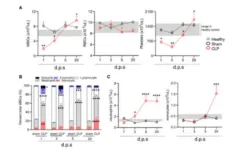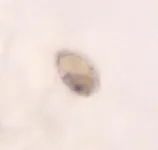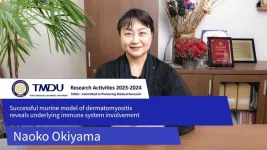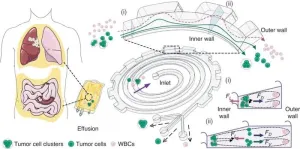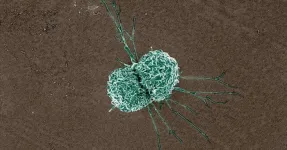(Press-News.org) Severe sepsis from bacterial or viral infections can be life-threatening and even people recovering from severe sepsis may experience long-lasting effects on the immune system, making them more susceptible to recurrent infections. The causes for this sepsis-induced immune suppression are not well understood and lack an effective treatment. To better understand the cause, Katherine MacNamara and colleagues from Albany Medical College, USA, analyzed the blood stem cells of mice with prior sepsis and their results were recently published in the journal Stem Cell Reports.
During acute infection, blood stem cells in the bone marrow are activated by signaling molecules called inflammatory cytokines, which make them divide and migrate to the blood stream to generate large quantities of immune cells outside the bone marrow. Once infection is eliminated, cytokine levels return to baseline and blood stem cell activation and immune cell production stops.
To understand how this process gets dysregulated after severe sepsis resolves, the researchers analyzed the blood stem cells of mice and found them to be fully recovered and functional in the bone marrow of mice 20 days after sepsis. However, upon a second round of inflammatory stimulation, using the stem cell mobilizing agent G-CSF, the blood stem cells of sepsis survivors did not undergo a new round of activation and mobilization as did those in mice without prior sepsis.
Consequently, immune cells were not efficiently produced in those mice with prior sepsis. These observations could explain why following sepsis, patients are unable to efficiently combat new infections and why giving inflammatory cytokines and G-CSF specifically to sepsis patients had no effect against secondary infections in previous clinical trials. This knowledge may help to identify new treatments for patients with post-sepsis immune suppression.
END
Blood stem cells unlock clues for helping sepsis patients fight recurring infections
2024-04-11
ELSE PRESS RELEASES FROM THIS DATE:
Climate: Increased threat to coastlines from concurrent heatwaves and sea level rises
2024-04-11
Concurrent occurrences of heatwaves and extreme short-term sea level rises at the same coastal locations significantly increased between 1998 and 2017 when compared to the preceding twenty years, reports a study published in Communications Earth & Environment. The study also suggests that these events may be five times more likely to occur between 2025 and 2049 under a modelled high emissions scenario.
A so-called ‘concurrent heatwave and extreme sea level’ (CHWESL) event is when a heatwave and an extreme short-term sea level rise occur at the same coastal location over the same time period. Although they ...
Second primary breast cancer in young breast cancer survivors
2024-04-11
About The Study: The results of this study suggest that young breast cancer survivors without a germline pathogenic variant have a low risk of developing a second primary breast cancer in the first 10 years after diagnosis. Findings from germline genetic testing may inform treatment decision-making and follow-up care considerations in this population.
Authors: Kristen D. Brantley, Ph.D., M.P.H., of the Harvard T. H. Chan School of Public Health in Boston, is the corresponding author.
To access ...
Physician empathy and chronic pain outcomes
2024-04-11
About The Study: In this study that included 1,470 adults with chronic low back pain, physician empathy was associated with better outcomes over 12 months. Greater efforts to cultivate and improve physician empathy appear warranted.
Authors: John C. Licciardone, D.O., M.S., M.B.A., of the University of North Texas Health Science Center at Fort Worth, is the corresponding author.
To access the embargoed study: Visit our For The Media website at this link https://media.jamanetwork.com/
(doi:10.1001/jamanetworkopen.2024.6026)
Editor’s ...
Tropical coral-infecting parasites discovered in cold marine ecosystems
2024-04-11
Parasites thought only to infect tropical coral reefs have been discovered in a large variety of creatures in cold marine ecosystems along the Northeast Pacific, according to new research from University of British Columbia botanists.
The finding, published today in Current Biology, greatly expands the range of corallicolids, suggesting the parasites infect a range of organisms related to coral, like sea anemones and other cold-water marine invertebrates, around the world.
“This highlights significant blind spots in our strategies designed to sample microbial biodiversity,” says University of British Columbia biodiversity researcher Dr. Patrick Keeling, senior author on the ...
Successful murine model of dermatomyositis reveals underlying immune system involvement
2024-04-11
Researchers from Tokyo Medical and Dental University (TMDU) have developed a murine model for a highly progressive disease called “anti-MDA5 antibody-positive dermatomyositis”, providing insights into underlying biological mechanisms and aiding treatment
Tokyo, Japan – Some diseases involve autoimmune reactions, when the body begins to attack its own cells and proteins. The biological mechanisms underlying these diseases are often unknown, making treatment challenging. Now, a group at TMDU has created a murine model for a disease ...
Next-gen lab chip transforms cancer detection: triple-threat cell sorting unveiled
2024-04-11
Researchers have unveiled a microfluidic device that significantly improves the separation of tumor cells and clusters from malignant effusions. This novel technology promises to advance the diagnosis and treatment monitoring of cancer by enabling the high-throughput, continuous-flow ternary separation of single tumor cells, tumor cell clusters, and white blood cells (WBCs) from clinical pleural or abdominal effusions.
Understanding the nature of malignant effusions, teeming with tumor cells and clusters, is critical in comprehending the breadth of cancer's impact. The significant role of tumor clusters, with their heightened potential ...
NCCN 2024 Annual Conference shares cancer care updates for practical, immediate use in practice
2024-04-11
PLYMOUTH MEETING, PA [April 11, 2024] — The National Comprehensive Cancer Network® (NCCN®)—an alliance of leading cancer centers—hosted more than 1,700 oncology professionals during the NCCN 2024 Annual Conference on April 5-7. The yearly meeting includes opportunities for care providers to interact with world-renowned specialists on the latest evidence-based expert consensus recommendations for delivering high quality, patient-centered cancer care. Sessions focused on practical applications for improving care at every level, including clinical and administrative ...
Genetic underpinnings of environmental stress identified in model plant
2024-04-11
Plants can be temperamental. Even weeds along the side of highways or pushing their way up in the cracks of concrete sidewalks can get stressed out by dehydration, cold, excess salt and more. Researchers at Hiroshima University have identified 14 genes that thale cress — a plant commonly used in genetic investigations since its genome is well documented — express more when responding to five specific stressors, as well as eight genes that the plant suppresses.
They published their results on March 22 in Frontiers in Plant Science.
“Abiotic stresses — as opposed to biotic stresses like pests or disease — such as drought, salinity and cold negatively ...
This outdated diabetes drug still has something to offer
2024-04-11
Thiazolidinediones (TZDs) are a class of drug that can be used to treat type 2 diabetes by reversing insulin resistance, one of the main hallmarks of the disease. While TZDs were extremely popular in the 1990’s and early 2000’s, they have fallen out of use among physicians in recent decades because they were discovered to cause unwanted side effects, including weight gain and excess fluid accumulation in body tissues.
Now, researchers at University of California San Diego School of Medicine are ...
Developing best practices for human-AI collaboration in engineering design
2024-04-11
As artificial intelligence is inevitably woven into the workplace, teams of humans will increasingly collaborate with robots on complex design problems, such as those in the auto, aviation, and space industries.
“Right now, design is mainly done by humans, and it’s based on their expertise and intuitive decision-making, which is learned over time,” says A. Emrah Bayrak, an assistant professor of mechanical engineering and mechanics in Lehigh University’s P.C. Rossin College of Engineering and Applied Science. “Usually, ...
